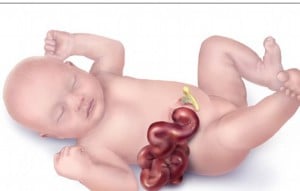According to health experts, a serious birth defect appears to be on the rise and no one has any idea why.
Infants with the defect, called gastroschisis, are born with intestines poking out of a hole in the abdominal wall. Other organs, like the stomach and liver, may also be found outside the body at birth.
In a recent study conducted by the American based Centers for Disease Control and Prevention, the prevalence of gastroschisis has increased by 30 per cent.

The defect has been shown to occur more often in babies born to mothers younger than 20, although the rate has increased overall for mothers of all ages. Generally, young white mothers give birth to babies with the defect more than young women of other races.
But during the period studied by the center, gastroschisis increased most dramatically among babies born to non-Hispanic black mothers age 20 or younger, showing a rise of a staggering 263 per cent.
Speaking with the New York Times newspaper, Coleen A. Boyle, the director of the C.D.C’s National Center on Birth Defects and Developmental Disabilities said, “We don’t know why. We continue to be concerned that this condition is increasing, and we do see a more rapid rise among non-Hispanic black teens.”
Women who drink alcohol or are smokers are more likely to have a baby with gastroschisis. But “those are risk factors, not causes,” said Dr. Boyle. “We don’t know if those risk factors are contributing to the increase.”
The defect — which can be seen via ultrasound during pregnancy — always requires surgery quickly after birth to put the abdominal organs back in the body and to repair the abdominal wall.
Speaking with the New York Times, Dr. Leslie A Lusk, a neonatologist at the University of California, San Francisco said, “There’s a big discussion among clinicians about how best to do that, and how invasive a procedure is needed,” said Dr. Lusk, “However, whatever the strategy, the bowel needs to be put back.”
Once the abdominal wall is closed, “babies can lead normal lives and fare very well,” assuming the bowel is not injured, Dr. Lusk said. “It’s a defect that can be addressed, and it’s not generally fatal. There can be long-term complications however, related to the bowel and a possible need for future surgery.”
A simple repair might require that a newborn stay in the hospital for three to six weeks; for a more complex case, hospital recovery can last months.
“In general, it’s a fixable problem, but we’d rather it was a preventable problem,” Dr. Lusk said.
Image source: Facebook & Getty Images




















-

-
-
coastalkaryn said
- 12 Feb 2016
-

-
-
madlac2 said
- 28 Jan 2016
-

-
-
mom94125 said
- 24 Jan 2016
-

-
-
mum4107 said
- 24 Jan 2016
-

-
-
Mummytoabeautifulprincess said
- 23 Jan 2016
-

-
-
mom74640 said
- 23 Jan 2016

-

-
-
rachelvk said
- 23 Jan 2016
-

-
-
mom90758 said
- 23 Jan 2016
-

-
-
mom165081 said
- 23 Jan 2016
-

-
-
mom103920 said
- 23 Jan 2016
-

-
-
aprilb1 said
- 23 Jan 2016
Post a comment8:39 am
4:31 pm
4:45 pm
5:22 am
9:53 pm
7:54 pm
3:41 pm
12:36 pm
11:22 am
10:16 am
9:32 am
To post a review/comment please join us or login so we can allocate your points.